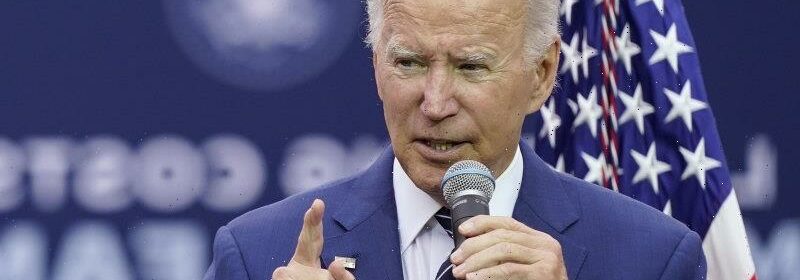Biden on Iran: Women ‘should be able to wear in God’s name what they want’

Key points
- US President Joe Biden says Iranian women “should be able to wear in God’s name what they want to wear”.
- Iran Supreme Leader Ayatollah Ali Khamenei warns protesters they can’t uproot the Islamic Republic.
- Iranian police deploy heavily in cities in southeast, southwest.
- Rights groups say more than 200 people have been killed in the crackdown, including teenage girls.
Washington: US President Joe Biden on Friday called on leaders in Iran to end the violence against its own citizens.
Women “should be able to wear in God’s name what they want to wear,” he said, during a speech at Irvine Valley Community College in California.
US President Joe Biden has expressed support for Iran’s women.Credit:AP
“Iran has to end the violence against its own citizens simply exercising their fundamental rights,” Biden said. The protests mark one of the boldest challenges to Iran’s clerical rule since the 1979 revolution, even if the unrest does not seem close to toppling the system.
In Iran, the country’s Supreme Leader Ayatollah Ali Khamenei said that no one should dare think they can uproot the Islamic Republic, in his toughest warning to protesters since Mahsa Amini’s death in police custody ignited nationwide unrest now in its fourth week.
Demonstrations by people from all walks of life, after the Iranian Kurdish woman’s death following her arrest for “inappropriate attire”, have evolved into widespread calls for the downfall of Khamenei and the Islamic Republic.
Khamenei compared the Islamic Republic to an unshakeable tree. “That seedling is a mighty tree now and no one should dare think they can uproot it,” he said on state TV.
Iranian supreme leader Supreme Leader Ayatollah Ali Khamenei.Credit:AP
Some of the deadliest unrest has been in areas home to ethnic minorities with long-standing grievances against the state, including Kurds in the northwest and Baluchis in the southeast.
Rights groups say more than 200 people have been killed in the crackdown, including teenage girls.
Amnesty International said at least 23 children have died.
Police deployed heavily on Friday in the city of Dezful, a witness said, after activists called for protests in the predominantly ethnic Arab, oil-rich province of Khuzestan at the Iraqi border.
Social media videos show protesters chanting “Death to the dictator” in Ahvaz, capital of Khuzestan. Basij volunteer militia forces leading the crackdown on motorbikes were seen pushing people back.
Protesters make fire and block the street during a protest over the death of a woman who was detained by the morality police, in downtown Tehran, Iran.Credit:AP
“There are dozens of Basijis. Pushing protesters, beating them. Men, women are chanting ‘We are Kurdistan, We are Lorestan’“, a witness said, slogans that are meant to show solidarity among Iran’s ethnic minorities.
There was heavy deployment of police and the Basij in Zahedan, the capital of Sistan-Baluchistan province at the border with Pakistan in the southeast, two witnesses said.
The activist 1500tasvir posted a video on Twitter purported to show protesters marching in Zahedan. “Crimes, crimes, death to this religious leadership,” they chanted, referring to Khamenei, who has been in power for 33 years.
Iran has blamed the violence on enemies at home and abroad, including armed separatists and Western powers. The authorities deny security forces have killed protesters. State TV reported at least 26 members of the security forces have been killed.
Deaths mount
Zahedan was the scene of one of the deadliest days yet on September 30 when Amnesty International has said security forces killed at least 66 people in a crackdown after prayers.
The authorities said Baluchi militants attacked a police station that day, triggering a shootout. The Revolutionary Guards said five members of their forces and the Basij were killed.
Iran, with a population of 87 million, is home to seven major ethnic minorities alongside majority Persians. Rights groups say minorities, including Kurds and Arabs, have long faced discrimination, which Iran denies.
A Revolutionary Guards major and a Basij militiaman were shot dead by “rioters” who were writing graffiti early on Friday in southern Fars province, state media reported.
Social media users reacted angrily to a video apparently showing a member of the riot police molesting a female protester in Tehran. Reuters could not verify the footage.
Ensiyeh Khazali, vice president for women’s affairs, called for a probe. Police said they would deal with anyone found accountable of a violation.
In the southwestern oil city of Abadan, some protesters were chanting “Death to the dictator” amid heavy presence of police and Basij, another witness said.
Security forces have also pressed their crackdown this week in Kurdish regions where the Revolutionary Guards have a track record of putting down dissent. Late on Friday, security forces opened fire in the city of Bukan, injuring several protesters, rights group Hengaw said. Reuters could not verify the report.
Reuters
Get a note directly from our foreign correspondents on what’s making headlines around the world. Sign up for the weekly What in the World newsletter here.
Most Viewed in World
From our partners
Source: Read Full Article


